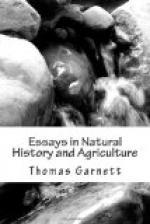First, “That they enter rivers to rid themselves of sea lice (Monoculus piscinus);” secondly, “That they forsake rivers to save themselves from being exhausted by residence in fresh water, and from having their gills devoured by a maggot (Lernaea salmonea).” The whole history of the Salmon contradicts this hypothesis. Another of these errors is, that it is asserted (Rep., 1824, p. 145), “That Salmon always return to the same river;” this is not probable, when we consider the circumstances in which they are placed during their residence in the sea. On the first of these opinions, I am not a competent judge; but I think that the fact that Salmon enter rivers nine or ten months before they are ready to spawn, is of itself sufficient to show that there are other reasons for their entering rivers than those connected with propagation. With respect to the second, I believe that after Salmon have once entered rivers, at least when they have ascended into the upper parts of them, they never offer to descend again until they have spawned. On the third opinion I would remark, that although I do not think that Salmon always come to the same river in which they were bred, yet I think they will do so if they can; and I think that the fact which I have mentioned of the Hodder, a smaller and a tributary stream to the Ribble, containing many more Salmon, as well as more Morts and Sprods, countenances this supposition, for why should the larger number of fish ascend the smaller river except for such a reason?
I am of opinion that Salmon do not grow so fast in the sea as is generally supposed. It is here generally believed that the Smolts, which go down in the spring, come up again in the August or September following, five or six pounds in weight; and George Little, Esq., in his evidence states that as his opinion, but he does not give any other reason for it than this: “That the Grilse that ascend the river in June weigh one and a half or two pounds, and that those which come in September weigh five or six pounds,” —but opposed to this supposition is the evidence of Mr. Mackenzie, before referred to (second Parl. Report, p. 21), who states that he caught in March a Grilse Kelt which weighed three and a half pounds, that he marked it with a brass wire, and let it go, and that in the March following he caught it again a Salmon of seven pounds weight. Now a fish which weighed three and a half pounds as a Kelt, would weigh five pounds or six pounds when in high condition the summer before, and if this were so, which I believe all persons who are acquainted with Salmon will admit, the fish would have gained only one pound or two pounds in fifteen or eighteen months. Besides, if Salmon grew as fast as is stated and believed by many persons, the breeds of different years would vary very much in weight, whereas it is known to everybody that we have them of all sizes, from five pounds to forty pounds; and it is contrary to analogy to suppose that a fish




